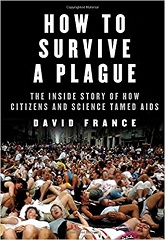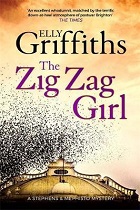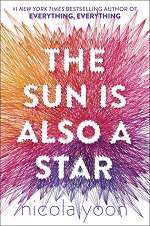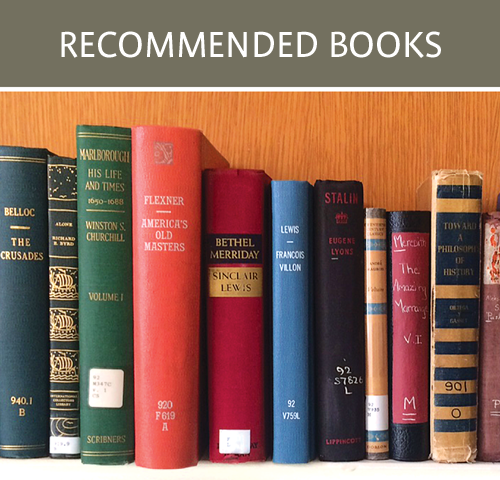What We Are Reading
"Read any good books lately?" We recently asked Library staff, and here is how they responded.
Exhaustively researched and elegantly told, How to Survive a Plague by David France chronicles the small group of men and women who fought for answers to the myriad crises caused by AIDS in the 1980s. They formed ACT UP to react to horrors AIDS wrought and counter the cold and indifferent response they received from politicians and medical professionals. Many of the men featured here are dying as they fight the government, the pharmaceutical industry, not to mention the prevailing opinion that people with AIDS were only getting what they deserved. This is story of a triumph over impossible odds by people who decided to fight for their lives. It is a companion to France’s acclaimed documentary which shares the book’s title, but takes advantage of its format to tell a more nuanced and detailed history than the movie was able to. Though the subject matter is difficult, the book is powerful beyond measure and unlikely to be equaled as a history of the period. —Patrick Rayner, Acquisitions Assistant/Circulation Assistant
1980s. They formed ACT UP to react to horrors AIDS wrought and counter the cold and indifferent response they received from politicians and medical professionals. Many of the men featured here are dying as they fight the government, the pharmaceutical industry, not to mention the prevailing opinion that people with AIDS were only getting what they deserved. This is story of a triumph over impossible odds by people who decided to fight for their lives. It is a companion to France’s acclaimed documentary which shares the book’s title, but takes advantage of its format to tell a more nuanced and detailed history than the movie was able to. Though the subject matter is difficult, the book is powerful beyond measure and unlikely to be equaled as a history of the period. —Patrick Rayner, Acquisitions Assistant/Circulation Assistant
I recently read the first two novels in Janet Lewis’s (1899-1998) “Circumstantial Evidence” trilogy, The Wife of Martin Guerre (1941) and The Trial of Soren Qvist (1947),  and these brief historical novels are just plain excellent. An acclaimed poet, Lewis crafted a precise prose style that is mesmerizing: evocative and rich, but true to her poet’s sense of economy and control. Guerre takes place in 16th century France, Qvist in 17th-century Denmark, and both movingly chronicle actual legal cases, delving deep into the lives of those involved. Lewis admirers include Larry McMurtry (read an appreciation in NYRB here), John Williams (Stoner), and Theodore Roethke, and critics have compared her fiction to Melville, Flaubert, and Stendhal. Although I am not a fan of horror or science fiction, I very much enjoyed The Edge of Running Water (1939) by William Sloane (1906-1974), a fine novel that elegantly employs classic elements of horror (“don’t open that door!”), sci-fi (a “mad” scientist figures prominently), and mystery/suspense, but is far more than a genre pastiche. With a dark atmosphere of dread, small town paranoia, and rich local color, The Edge of Running Water is a captivating exploration of death, friendship, grief, and the after-life that has a way of digging into a reader. —Steven McGuirl, Head of Acquisitions
and these brief historical novels are just plain excellent. An acclaimed poet, Lewis crafted a precise prose style that is mesmerizing: evocative and rich, but true to her poet’s sense of economy and control. Guerre takes place in 16th century France, Qvist in 17th-century Denmark, and both movingly chronicle actual legal cases, delving deep into the lives of those involved. Lewis admirers include Larry McMurtry (read an appreciation in NYRB here), John Williams (Stoner), and Theodore Roethke, and critics have compared her fiction to Melville, Flaubert, and Stendhal. Although I am not a fan of horror or science fiction, I very much enjoyed The Edge of Running Water (1939) by William Sloane (1906-1974), a fine novel that elegantly employs classic elements of horror (“don’t open that door!”), sci-fi (a “mad” scientist figures prominently), and mystery/suspense, but is far more than a genre pastiche. With a dark atmosphere of dread, small town paranoia, and rich local color, The Edge of Running Water is a captivating exploration of death, friendship, grief, and the after-life that has a way of digging into a reader. —Steven McGuirl, Head of Acquisitions
The Wangs vs. the World, a debut novel by Jade Chang, is an engaging chronicle of an American-Chinese family’s riches to rags story, and their ensuing, often amusing road trip across the United States. Entertainingly and interestingly told in the alternating perspectives of the Wang family members, readers come to learn that, ultimately, what matters most on our journeys is the love we share with those travelling with us. —Cathy McGowan, Circulation Librarian/Interlibrary Loan Librarian
Serendipity led me to read two books in succession that share the same unusual time period, profession, and place: post-WW2 magicians at the English seaside resort town of Brighton. It began with an overheard conversation between two Library colleagues. They had both enjoyed Neil Bartlett’s The Disappearance Boy, so I made sure to make it next on my reading list. I found a quick and satisfying novel with fleshed- out, memorable characters, and a sweetly poignant ending. Elly Griffiths’ The Zig Zag Girl was found on the reshelving cart in the Circulation workroom one afternoon. I checked it out based on the cover and was pleasantly surprised to find that I was once again in the world of stagecraft and postwar Brighton. This time there’s been a series of murders that recall magician’s tricks. Griffith’s dry sense of humor and misdirections kept me reading until all was cleverly revealed. —Mia D’Avanza, Head of Circulation
seaside resort town of Brighton. It began with an overheard conversation between two Library colleagues. They had both enjoyed Neil Bartlett’s The Disappearance Boy, so I made sure to make it next on my reading list. I found a quick and satisfying novel with fleshed- out, memorable characters, and a sweetly poignant ending. Elly Griffiths’ The Zig Zag Girl was found on the reshelving cart in the Circulation workroom one afternoon. I checked it out based on the cover and was pleasantly surprised to find that I was once again in the world of stagecraft and postwar Brighton. This time there’s been a series of murders that recall magician’s tricks. Griffith’s dry sense of humor and misdirections kept me reading until all was cleverly revealed. —Mia D’Avanza, Head of Circulation
Children’s and Young Adult
Garvey’s Choice is a superlative novel in verse by Nikki Grimes. In 105 brief tanka poems, Grimes breaks readers’ hearts and puts them back together again with the tale of Garvey, a voracious reader, a good friend, a budding scientist, and a music aficionado. Unfortunately, Garvey seems to frustrate his dad on a daily basis with his indifference to sports and exercise coupled with his penchant for extra helpings at dinner. Each day Garvey moves quietly through the world absorbing disappointed looks from his dad and bullying taunts from school mates about his increasing weight. With the support and encouragement of a few good friends Garvey makes a brave decision to seek his own creative path and find his true voice in spite of the spotlight that will shine on him. —Randi Levy, Head of the Children's Library 
Our Young Adult-High School section continues to grow in size. And while I don’t get to read every title we select, I try to consume as many as I can. Lately, I’ve been concentrating on the award winners. I heartily recommend any of the following: Jeff Zentner’s The Serpent King (William C. Morris debut fiction prize), Nicola Yoon’s The Sun Is Also A Star (Printz Honor title and Coretta Scott King-John Steptoe New Talent Author Award), Meredith Russo’s If I Was Your Girl (Stonewall Book Award), Gavriel Savit’s Anna and the Swallow Man (Sydney Taylor Book Award Finalist), Julie Berry’s The Passion of Dolssa (Printz Honor title), and John Lewis’s March, Book Three (Printz Medalist, Coretta Scott King Author Book Award, Seibert Award winner, and YALSA Award for Excellence in Nonfiction). Look for these newest additions in the lobby. And if you’re an e-reader, look for the 2017 Alex Award Winners (adult books that appeal to teens) shelf in our Cloud Library. —Susan Vincent Molinaro, Children’s Librarian (and Unrepentant YA Enthusiast)
When it comes to dystopian novels, there are few that top Printz and Newbery award honor The House of the Scorpion by Nancy Farmer. Set in the borderland between Mexico and the United States in the futuristic 2130’s, the novel follows the life of Matt Alacran, a young boy living in a world riddled with pollution, drugs, violence, and medically-altered people. I fell right into the story from the very beginning, and couldn’t stop until I knew how this face-paced saga ended. I enjoyed the characters and plot so much that I immediately started reading the sequel, The Lord of Opium, which takes place right after the events of the first book. —Danielle Gregori, Children's LIbrarian

